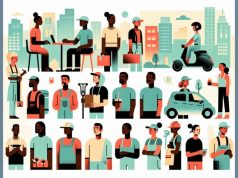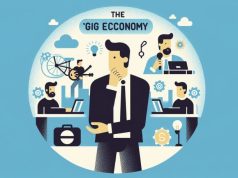Today at The Work Times, we embark on an explorative journey into the heart of the gig economy with one of the leading voices in labor economics. Our distinguished guest, Dr. Eliza Robinson, has dedicated her life to understanding the nuances of labor markets and the impact of emerging work trends on society. With the gig economy’s proliferation raising as many questions as it does opportunities, we invite you to join us in a candid conversation that reveals the layers beneath the surface of gig work.
As we sit down in our virtual lounge, Dr. Robinson wastes no time in highlighting the paradox that lies at the core of gig employment: the delicate balance between flexibility and security. ‘The gig economy is often lauded for the autonomy it grants workers,’ she states, ‘yet it is this very freedom that can lead to vulnerability and instability.’ Companies like Uber, DoorDash, and Upwork have disrupted traditional industries by championing a model where workers are no longer employees but independent contractors.
While these platforms present themselves as beacons of entrepreneurial spirit, our guest urges us to scrutinize the small print. Dr. Robinson presents a compelling argument, backed by her extensive research, about how this shift is not merely a transformation of work but a redefinition of the employer-employee relationship. ‘What we’re witnessing is the rise of a system where the risk is increasingly transferred from companies to individuals,’ she explains. ‘A system that, without proper regulation, could erode the social safety net painstakingly woven over the last century.’
We delve into the complexity of this workforce evolution, discussing how the gig model could be a double-edged sword. Dr. Robinson articulates the allure of gig work—flexible hours and the promise of being one’s own boss. Yet this very allure can blur the lines between independence and isolation, between gig work as a choice and as a necessity. We discuss real-life stories of gig workers, piecing together long hours with no guaranteed minimum wage, no health insurance, no retirement plans—benefits that were once cornerstones of employment.
As we dissect the implications for workers’ rights, our expert does not shy away from the socioeconomic consequences. ‘The gig economy could be a revolutionary force, democratizing work and offering unparalleled flexibility,’ she acknowledges. ‘However, without thoughtful integration into the framework of our labor laws, it risks becoming a regressive step, pulling us back to a pre-industrial era of labor relations.’
In conclusion, Dr. Robinson leaves us with a reflection on the greater narrative. The conversation turns to policymakers and the responsibility they bear in shaping a future that protects workers while fostering innovation. ‘The gig economy doesn’t have to be the villain in our story,’ she concludes. ‘With the right checks and balances, it has the potential to enrich our workforce. The question remains, will we rise to the challenge?’
We thank Dr. Robinson for her invaluable insights and encourage our readers to continue this conversation. As the gig economy continues to unfold, The Work Times remains committed to providing thoughtful analysis and fostering dialogue on the transformation of work in America and beyond.
Is the gig economy a revolution in the making, or are we headed towards a cautionary tale? We invite you to share your thoughts and join the discourse.




























